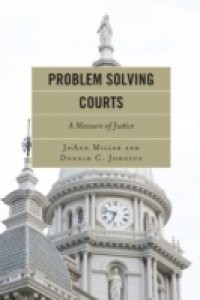Problem Solving Courts explores a relatively new approach to criminal justiceone that can have a powerful impact on how convicts connect with their communities. Problem solving courts, born out of the drug court movement in the 1980s, are run by judges who, with the assistance of law enforcement agents and mental health workers, meet with convicts on a weekly basis to talk about their treatment. Treatment programs often include therapy, in addition to the possibility of incarceration or early parole in which an offender can complete his or her sentence under the jurisdiction of the court. In this unique collaboration, scholar JoAnn Miller and judge Donald C. Johnson, creators of three successful problem solving courts themselves, address the compelling needs for alternatives to prisons, analyze problem solving courts in depth, and assess the impact problem solving courts can have on convicts and their communities. Problem solving courts can include: community courts that seek to improve the quality of life in neighborhoods struggling with crime and disorder; drug treatment courts that link addicted offenders to drug treatment instead of incarceration; family treatment courts that seek to stop the cycle of drugs, child neglect, and foster care; and domestic violence courts that emphasize victim safety and defendant accountability.

